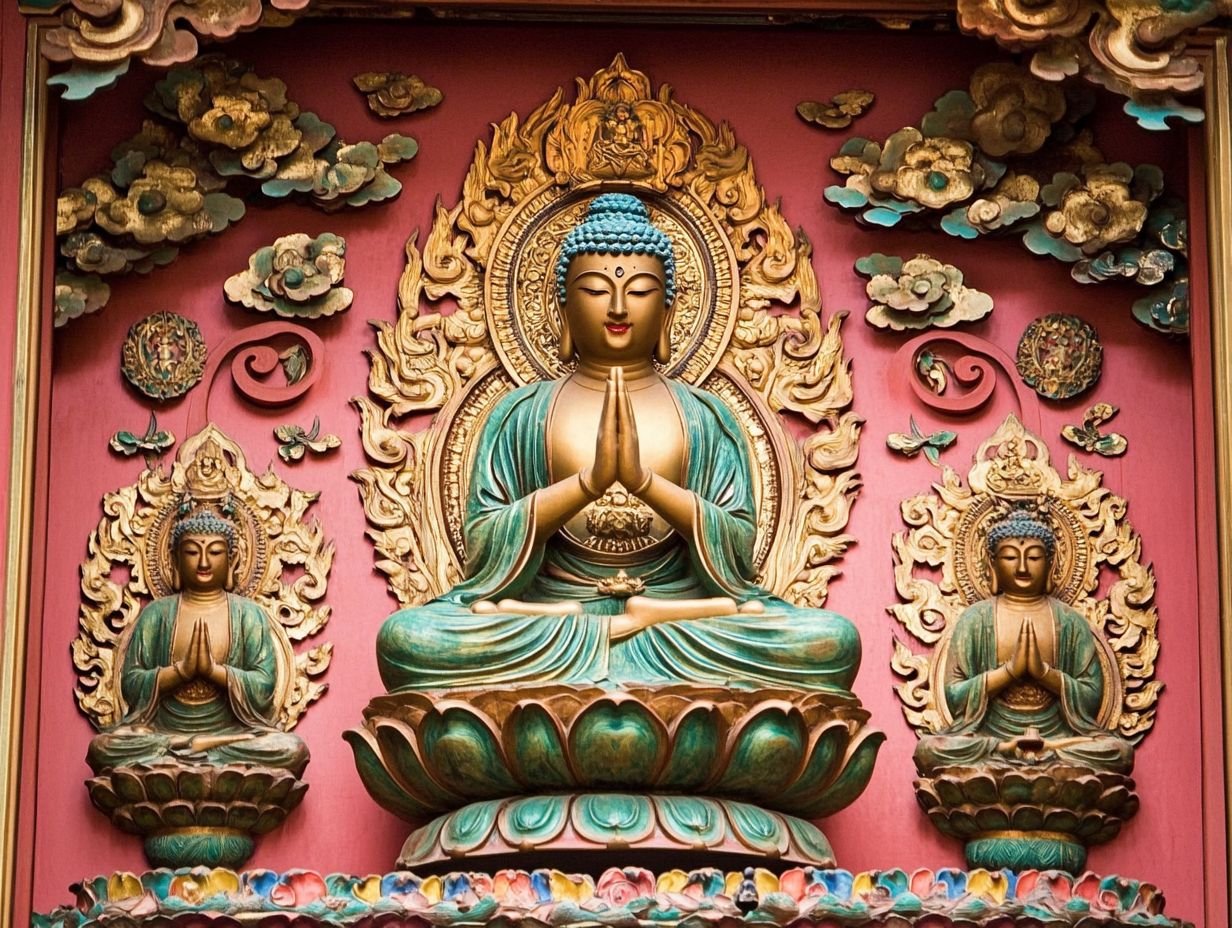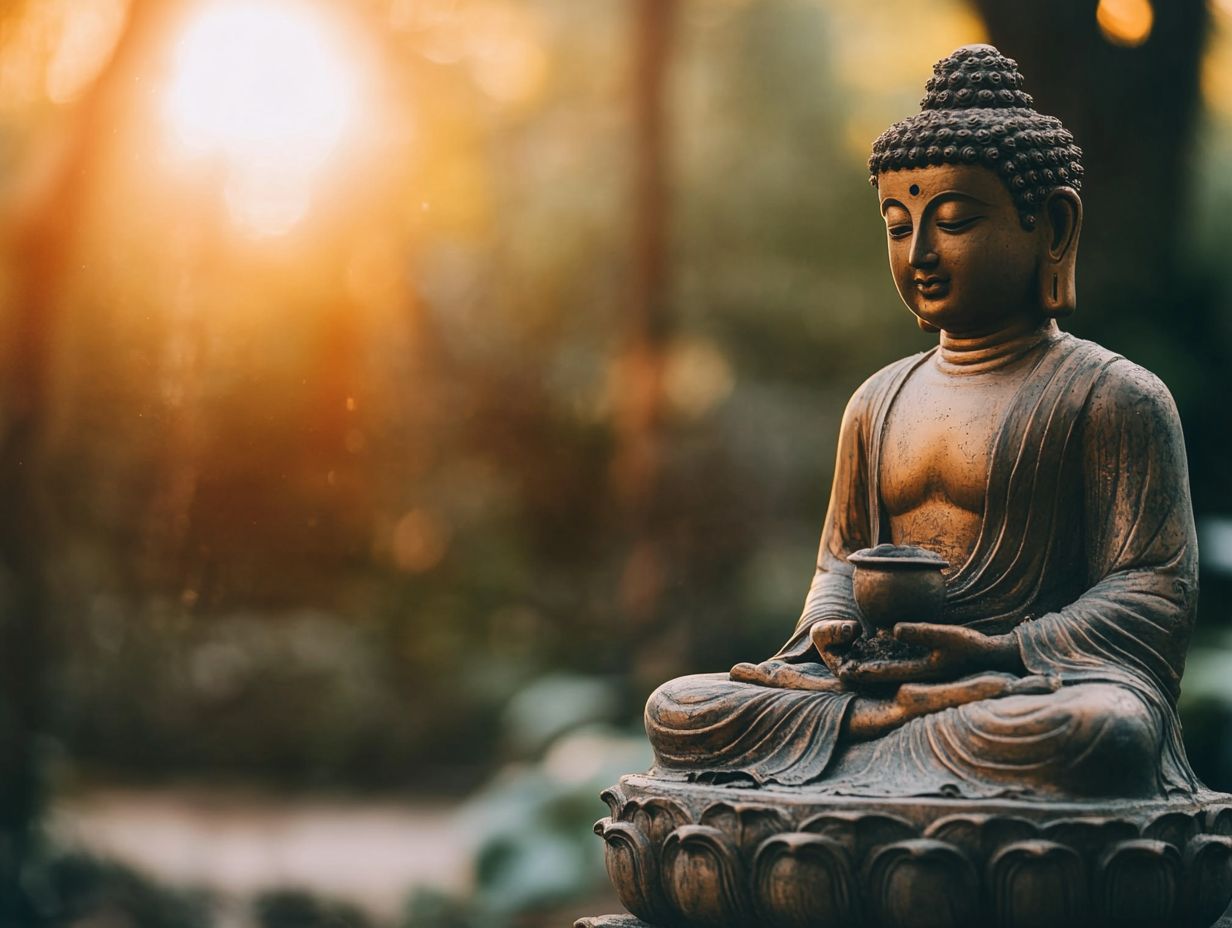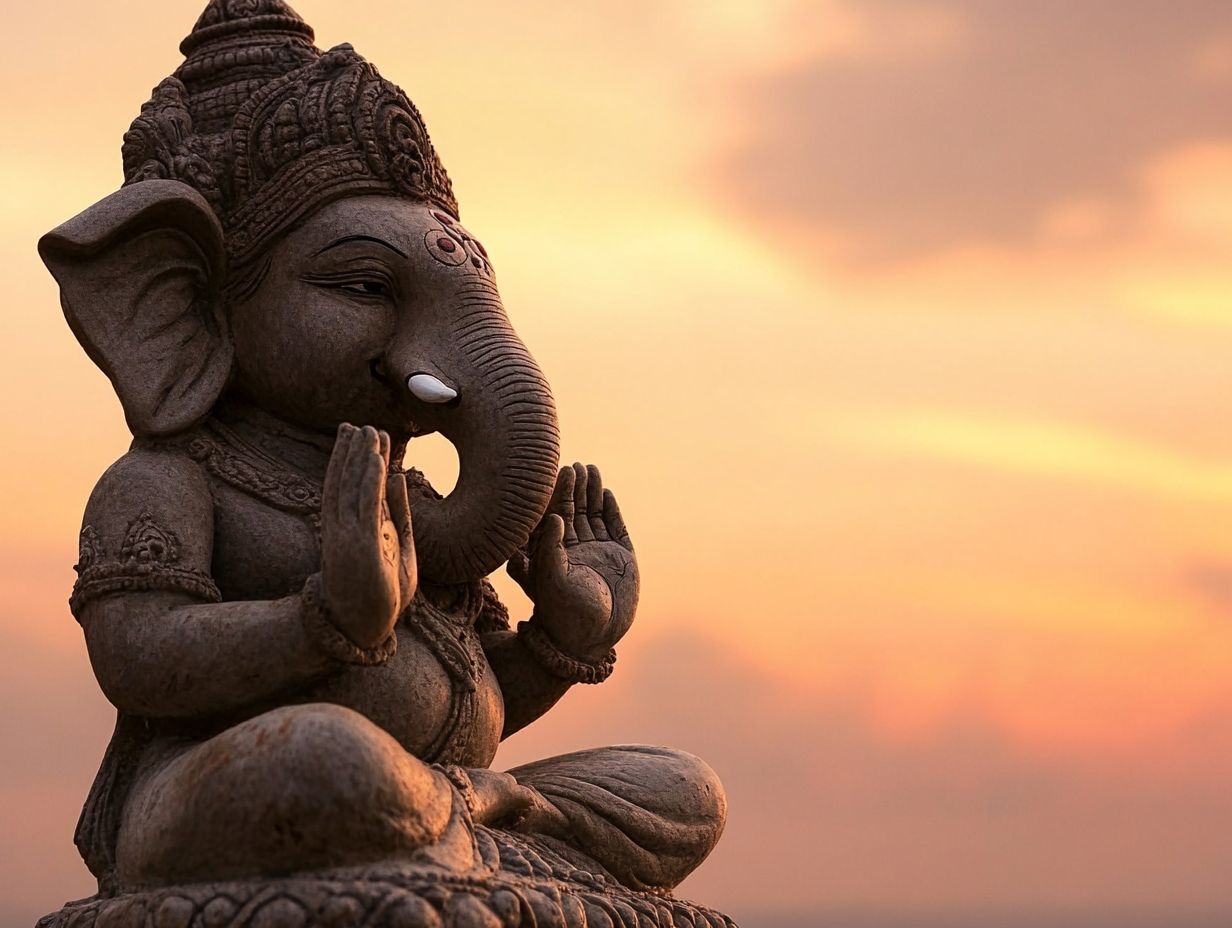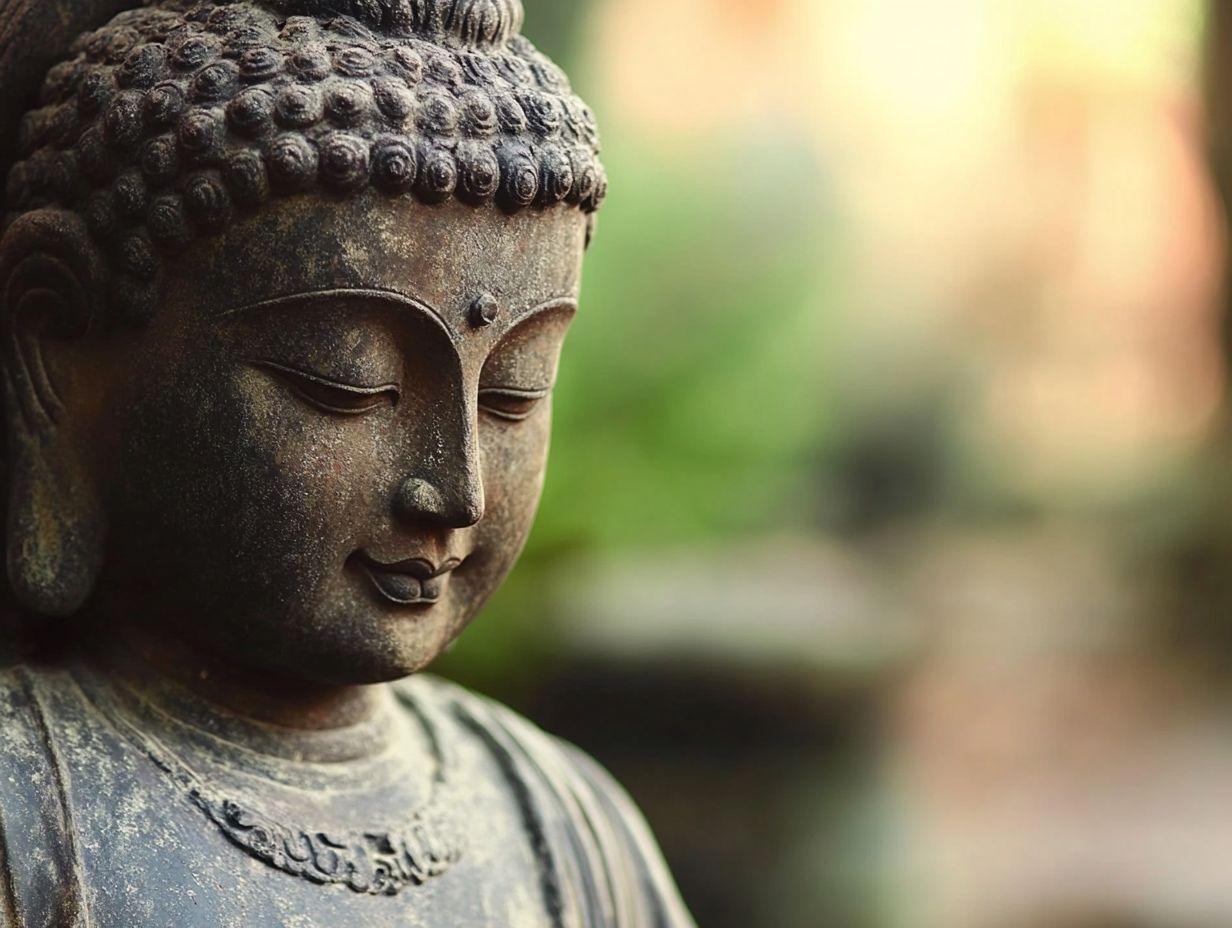What Beliefs Do Hinduism and Buddhism Share?
Hinduism and Buddhism, two of the world’s most profound religions, weave a rich tapestry of beliefs and practices that have influenced millions for centuries. Originating from the same cultural backdrop of ancient India, each religion presents unique perspectives on spirituality, ethics, and the nature of existence, including their shared beliefs in karma and reincarnation.
This exploration delves into the core tenets of both traditions, illuminating their similarities such as the belief in reincarnation and the significance of karma while also addressing their key differences, including their distinct views on the divine principles and the paths to spiritual enlightenment.
This journey offers an opportunity to grasp the intricate connections and contrasts that define these two influential traditions, shedding light on their philosophical concepts and spiritual paths.
What is Hinduism?

Hinduism stands as one of the world’s oldest religions, distinguished by a rich tapestry of beliefs, practices, and philosophies that highlight the profound interconnectedness of life and the nature of reality. Its roots are deeply embedded in ancient Indian culture, encompassing a diverse array of deities, rituals, and revered scriptures such as the Vedic texts, Upanishads, and Pali Canon.
Central to Hindu thought are the pivotal concepts of karma and dharma, which serve as guiding principles for moral values and ethical conduct, profoundly influencing how adherents navigate the complexities of life, death, and the cycle of reincarnation, or samsara.
Through a variety of spiritual practices, including meditation, yoga, and karma yoga, followers endeavor to achieve self-realization and attain spiritual liberation, known as moksha.
What is Buddhism?
Buddhism stands as a profound spiritual and philosophical tradition, rooted in the teachings of Siddhartha Gautama, widely revered as the Buddha. This tradition endeavors to unravel the complexities of suffering and delineate the path toward enlightenment, or nirvana.
Originating in the 5th century BCE, Buddhism underscores the importance of ethical living, mindfulness, and compassion, advocating for the relinquishment of desire and non-attachment as essential steps towards liberation from the cycle of samsara, or reincarnation.
Through dedicated practices such as meditation and adherence to the Four Noble Truths and the Eightfold Path, practitioners pursue a deep and meaningful comprehension of truth and reality, ultimately aspiring to attain the exalted state of nirvana. Buddhism is also divided into various schools, including Mahayana and Theravada, each with its unique teachings and practices, such as the Bodhisattva path.
Similarities between Hinduism and Buddhism
Hinduism and Buddhism, though distinct in their philosophies and practices, maintain a profound connection through several core beliefs that significantly shape the spiritual landscape of South Asia. These shared beliefs include karma, dharma, reincarnation, and the importance of spiritual practices.
Both religions uphold karma and dharma as foundational principles that govern ethical conduct and personal growth across lifetimes. The belief in reincarnation, embodying the cyclical nature of life, serves as a backdrop for both traditions, inviting followers to delve into existential questions regarding the self, reality, and the universe.
Furthermore, practices such as meditation are central to both faiths, cultivating mindfulness, inner peace, and the pursuit of enlightenment. Both traditions also emphasize the importance of ethical conduct and compassion in their teachings and practices.
1. Belief in Reincarnation
The belief in reincarnation, or samsara, stands as a cornerstone in both Hinduism and Buddhism, illustrating the cyclical nature of existence and the soul’s ongoing journey through myriad life forms. In Hinduism, this concept is intricately intertwined with the laws of karma, which assert that an individual’s actions in past lives profoundly influence their present conditions and future rebirths.
Similarly, Buddhism posits that the cycle of reincarnation is determined by karmic actions, underscoring the significance of ethical living to shape future existences and facilitate spiritual evolution. Both Hinduism and Buddhism also stress the importance of non-attachment and the need to transcend worldly desires.
This complex interplay between karma and reincarnation highlights the idea that individuals are the architects of their own destinies, with each life offering unique opportunities for growth and learning. Within Hindu philosophy, the attainment of moksha, or liberation from the cycle of samsara, necessitates a deep understanding of one’s true self and adherence to dharma. Moreover, the guru plays a vital role in guiding individuals on their spiritual journeys.
In contrast, Buddhist aspirants strive to reach Nirvana, a state characterized by the absence of suffering and desire.
Both traditions acknowledge that the soul’s journey transcends mere escape from the physical realm; it encompasses profound self-realization and moral development. This encourages practitioners to nurture compassion and mindfulness in their daily lives, fostering a deeper connection to both themselves and the world around them. Additionally, ascetic practices and devotional practices are integral to achieving spiritual growth in both traditions.
2. Emphasis on Karma
Karma, the principle of cause and effect stemming from one’s actions, serves as a fundamental theme in both Hinduism and Buddhism, shaping ethical conduct and moral values within each tradition. In Hinduism, karma is intricately linked to the concepts of dharma the fulfillment of one s duty guiding individuals toward a life of righteousness.
In contrast, Buddhism interprets karma through the lens of intention, underscoring the importance of mindful actions in crafting one s spiritual journey and ultimately attaining enlightenment.
The ethical ramifications of karma resonate profoundly in the lives of adherents, as both faiths impart the lesson that the repercussions of one s actions can extend beyond this life, influencing future incarnations. In Hinduism, the fulfillment of dharma not only strengthens personal karma but also sustains cosmic balance, highlighting that collective actions carry significance for society at large. In Buddhism, ethical conduct forms the basis for spiritual progress and societal harmony.
Conversely, Buddhism urges practitioners to nurture awareness and compassion, ensuring that each choice reflects their inner motivations and contributes to a more harmonious existence.
This nuanced understanding of karma inspires individuals to engage in spiritual practices such as meditation and community service, cultivating a sense of interconnectedness that transcends mere self-interest.
3. Practice of Meditation

Meditation stands as a cornerstone in both Hinduism and Buddhism, serving as a profound instrument for cultivating mindfulness, self-awareness, and the ultimate pursuit of enlightenment. In Hindu traditions, meditation techniques frequently involve the repetition of mantras, yogic practices, and other contemplative practices that harmonize the mind and body with the divine essence.
Conversely, Buddhism places a strong emphasis on mindfulness meditation and the development of concentration, fostering insights into the nature of suffering and the impermanence of life, thereby guiding practitioners toward a deeper understanding of reality.
Both traditions underscore the transformative potential of meditation, inviting individuals to explore their inner landscapes and engage in meaningful self-reflection. In Hinduism, the essence of meditation is intertwined with the pursuit of self-realization, which enables practitioners to acknowledge their true nature and their oneness with the universe.
Meanwhile, Buddhism’s focus on mindfulness not only amplifies awareness of the present moment but also assists in the release of attachments, ultimately paving the way for liberation from the cycle of rebirth.
As individuals immerse themselves in these meditative practices, they frequently encounter emotional healing, enhanced clarity of thought, and a more profound connection to their spiritual journeys, culminating in a richer and more fulfilling life.
4. Importance of Non-Violence
Non-violence, known as ahimsa, stands as a fundamental ethical principle in both Hinduism and Buddhism, highlighting the significance of compassion and respect for all living beings. In Hinduism, ahimsa is regarded as an essential duty that shapes interactions among individuals, fostering a harmonious society. Buddhism amplifies this concept by asserting that non-violence is crucial for personal liberation and societal peace, encouraging practitioners to cultivate compassion in their thoughts and actions.
This dedication to non-violence deeply influences moral values, prompting adherents to reflect on the consequences of their actions on others. In communities shaped by these religions, practices such as vegetarianism and peaceful conflict resolution exemplify a collective aspiration to live ethically. The focus on ahimsa creates environments of understanding and cooperation, as individuals strive to alleviate suffering not only for themselves but for all sentient beings. Moreover, the practice of non-violence is seen as a pathway to personal and societal liberation.
By cultivating a culture of empathy rooted in shared beliefs in non-violence, both faiths continue to inspire interfaith dialogue and community initiatives, reinforcing a universal appeal for peace.
5. Focus on Inner Peace and Enlightenment
Both Hinduism and Buddhism emphasize the pursuit of inner peace and enlightenment, viewing these states as vital milestones on the spiritual journey. In Hinduism, the path to enlightenment is often characterized by adherence to dharma and participation in spiritual practices such as yoga, meditation, and devotional practices, which foster a deeper connection to the divine essence.
Conversely, Buddhism presents the Four Noble Truths and the Eightfold Path as practical frameworks guiding practitioners toward enlightenment, urging them to confront and comprehend suffering in order to achieve spiritual liberation. This path often includes practices related to mindfulness meditation, compassion, and ethical conduct.
Both traditions feature a rich tapestry of practices designed to cultivate mindfulness and self-awareness, which are essential for nurturing tranquility. Hindu philosophical texts, such as the Upanishads and the Vedas, explore profound concepts like Brahman and Atman, advocating for an understanding of the self’s unity with the universe. Meanwhile, Buddhists practice metta meditation and mindfulness meditation, which foster loving-kindness and compassion toward oneself and others, thereby transforming interpersonal relationships and societal dynamics.
Techniques such as pranayama and karma yoga in Hinduism and mindfulness in Buddhism further enhance practitioners’ abilities to maintain calm amidst life’s challenges. This underscores the shared objective of both pathways: transcending the mundane in pursuit of a higher spiritual existence and spiritual enlightenment.
Differences between Hinduism and Buddhism
Hinduism and Buddhism, while rooted in several foundational beliefs and shared beliefs, exhibit significant divergence in their philosophies and practices, particularly regarding their understanding of the divine, the role of rituals, and the concept of the caste system.
Hinduism is distinguished by its polytheistic framework, featuring a multitude of gods and deities and sacred texts like the Vedas and Upanishads. In contrast, Buddhism is often regarded as non-theistic, emphasizing individual spiritual development over the worship of a divine being.
The role of rituals further illustrates this distinction; Hinduism places heavy emphasis on elaborate rituals and ceremonies, while Buddhism advocates for simpler practices and meditation practices designed to foster enlightenment through personal discipline and insight.
1. Concept of God
The concept of God in Hinduism is marked by a rich tapestry of polytheism, where a multitude of gods and deities embody various aspects of existence and the cosmos, providing followers with diverse avenues for devotion and worship. In stark contrast, Buddhism eschews a theistic framework, placing a strong emphasis on personal spiritual development and the inner journey toward enlightenment and the pursuit of Nirvana. This non-theistic philosophy centers on the nature of existence rather than the veneration of deities.
This fundamental distinction in the understanding of the divine profoundly influences the spiritual practices and worldviews of their adherents. In Hinduism, worship rituals can range significantly, from grand ceremonies held in temples featuring idols that represent the deities to more intimate pujas conducted within the home, fostering emotional connections and communal gatherings.
Additionally, Hinduism’s sacred texts, the Vedas and Upanishads, provide comprehensive guidelines for various spiritual practices and devotional practices.
Conversely, practitioners of Buddhism engage in meditation, mindfulness, and ethical living as pathways to attain Nirvana, reflecting a more introspective and experiential approach to spirituality. By grasping these nuances, one can truly appreciate how these religious frameworks shape the lives of their followers, impacting everything from daily rituals to the moral ethos that underpins their respective communities.
Buddhist practices can vary greatly between different traditions such as Mahayana and Theravada, each with its unique focus on achieving spiritual enlightenment and liberation.
2. Role of Rituals and Worship

Rituals and worship serve as cornerstones of Hinduism, where intricate ceremonies and offerings to various gods and deities are deemed vital for preserving cosmic harmony and expressing personal devotion. In stark contrast, Buddhism prioritizes meditation and mindfulness over ritualistic worship, emphasizing personal discipline, non-attachment, and ethical living as the true pathways to enlightenment and self-realization, rather than dependence on external ceremonies.
This fundamental divergence underscores the diverse spiritual practices embraced by adherents of each tradition. For Hindu practitioners, engaging in rituals acts as a conduit for connecting with the divine and nurturing community ties, enriching their spiritual journeys through collective experiences.
Hinduism also emphasizes the importance of dharma, or righteous living, which guides individuals in their daily actions and spiritual growth.
Conversely, Buddhist followers often strive to cultivate inner peace and clarity through introspection, perceiving rituals as potentially distracting rather than critical.
Instead, they focus on the Four Noble Truths and the Eightfold Path as essential teachings that guide their spiritual practices.
The implications of these contrasting beliefs profoundly influence how individuals navigate their spirituality, shaping everything from their daily practices to their comprehension of ultimate truths and their unique paths toward liberation.
3. Views on Caste System
The caste system, an intricate social hierarchy inherent to Hindu society, is perceived through a markedly different lens in Buddhism, which champions equality and rejects inflexible social divisions. Within Hinduism, the caste system is frequently interpreted as a manifestation of one s karma and dharma, shaping an individual s social standing and duties throughout their lifetime. Conversely, Buddhism places a premium on moral values and ethical principles that rise above societal stratifications, advocating for a communal ethos where all individuals are regarded as equals, irrespective of their backgrounds.
This approach is reflected in Buddhist teachings, particularly within the Theravada and Mahayana traditions.
This fundamental divergence prompts profound inquiries into social justice and human dignity. While the caste system delineates individuals based on birth and ascribed roles often entrenching cycles of inequality Buddhist teachings illuminate the inherent worth of each individual and their potential for compassion and enlightenment. Such a distinction encourages contemplation on how societies might foster inclusivity rather than exclusion, nurturing environments where ethical living and mutual respect serve as the foundations of community interactions.
This reflects the Buddhist principles of non-violence (ahimsa) and compassion, which are central to their doctrine.
Ultimately, the stark contrast between the rigid constructs of the caste system and the fluidity of Buddhist egalitarianism underscores an ongoing dialogue pertaining to morality, spirituality, and societal roles. This dialogue includes critical reflections on religious doctrines and ethical principles that shape both individual and communal life.
4. Path to Enlightenment
The path to enlightenment in Hinduism is characterized by a multifaceted approach that encompasses spiritual practices such as meditation, yoga, and adherence to dharma, each shaping the individual s journey toward self-realization. In contrast, Buddhism offers a more structured framework through the Four Noble Truths and the Eightfold Path, presenting clear guidelines for overcoming suffering and achieving enlightenment through ethical conduct, mindfulness, and meditation.
Both paths emphasize the importance of liberation from the cycle of rebirth, known as moksha in Hinduism and nirvana in Buddhism.
Both religions underscore the significance of inner transformation, yet they express these ideals through differing methodologies. In Hinduism, adherents can select from various paths, including Bhakti (devotion), Karma (action), and Jnana (knowledge), which allows for personal flexibility and adherence based on individual disposition. Additionally, Hinduism promotes the practice of karma yoga to achieve spiritual growth.
On the other hand, Buddhism adopts a notably pragmatic approach, emphasizing systematic practices that cultivate insight and compassion. This structured path encourages practitioners to engage in right actions, speech, and livelihood, ensuring that the journey toward enlightenment transcends mere philosophy and becomes a lived experience. It provides tangible tools for alleviating suffering while fostering a profound sense of interconnectedness with all beings.
This approach is particularly evident in the Mahayana tradition, which introduces the concept of the Bodhisattva, a being dedicated to achieving enlightenment for the sake of all sentient beings.
5. Attitude towards Material World
Hinduism generally embraces a more nuanced perspective on the material world, regarding it as an essential component of the journey toward spiritual liberation. In contrast, Buddhism advocates for a detachment from material desires as a means of overcoming suffering. Within Hindu philosophy, the material world is frequently perceived as a realm for fulfilling one’s dharma, while Buddhism underscores the impermanence of material attachments and the necessity of relinquishing them to attain inner peace and enlightenment.
Both traditions acknowledge the role of meditation in achieving a deeper understanding of the material and spiritual realms.
This fundamental divergence in perspective profoundly influences how adherents of each faith approach ethical living and spiritual practices. For Hindus, engaging with the material world can serve as a pathway to deeper understanding and self-realization, grounded in the belief that every action contributes to one’s spiritual evolution. Alternatively, Buddhists may promote a more ascetic lifestyle, emphasizing mindfulness and meditation to cultivate an awareness that distinguishes them from the fleeting nature of worldly possessions.
This approach is rooted in the Buddhist principle of non-attachment.
The implications of these contrasting views can manifest in varied expressions of spirituality. Hindu rituals may celebrate the material aspects of life as acts of devotion to the divine, while Buddhist practices often strive to transcend worldly attachments, aiming to uncover a profound inner stillness. This demonstrates the Hindu belief in the unity of the material and spiritual worlds, and the Buddhist pursuit of liberation through non-attachment.
Frequently Asked Questions
What Shared Beliefs Do Hinduism and Buddhism Share?

Hinduism and Buddhism are two major religions that originated in ancient India. While they have distinct philosophical and cultural differences, there are also many shared beliefs between the two. Here are some frequently asked questions about the beliefs that Hinduism and Buddhism share.
Do Hinduism and Buddhism Have a Common Origin?
Yes, both Hinduism and Buddhism are ancient religions with roots in India, and share many philosophical concepts and traditions.
Yes, both Hinduism and Buddhism have their roots in ancient India. Hinduism is believed to have originated around 1500 BCE, while Buddhism emerged around 500 BCE as a reform movement within Hinduism. Both religions have been heavily influenced by each other over the centuries.
What is the Concept of Karma in Hinduism and Buddhism?
In both Hinduism and Buddhism, karma refers to the law of cause and effect. It is believed that one’s actions in this life will determine their fate in their next life. Both religions emphasize the importance of performing good deeds to accumulate positive karma and break the cycle of rebirth, known as samsara.
In both Hinduism and Buddhism, karma refers to the law of cause and effect. It is believed that one’s actions in this life will determine their fate in their next life. Both religions emphasize the importance of performing good deeds to accumulate positive karma and break the cycle of rebirth.
Do Hinduism and Buddhism Share a Similar View on Reincarnation?
Yes, both Hinduism and Buddhism share similar beliefs regarding reincarnation, where the soul or consciousness undergoes a cycle of birth, death, and rebirth, influenced by one’s karma from previous lives.
Yes, both religions believe in the concept of reincarnation, or the cycle of birth, death, and rebirth, known as samsara. However, they have different interpretations of how this process works. Hinduism believes in an eternal soul called Atman that is reborn into different bodies, while Buddhism sees the self as an illusion and focuses on the impermanence of existence. To explore more about the similarities, you can read about which characteristic do Buddhism and Hinduism share.
Do Hinduism and Buddhism Share Beliefs About the Path to Enlightenment?
Both Hinduism and Buddhism view achieving enlightenment or liberation from suffering as the ultimate goal. In Hinduism, this is known as moksha, while in Buddhism, it is termed nirvana. However, they have different paths to reach this goal. Hinduism advocates for the path of devotion and worship through practices such as karma yoga and rituals, while Buddhism emphasizes the path of meditation, non-attachment, and detachment from desires.
Are There Shared Beliefs About the Nature of the Universe and Existence in Hinduism and Buddhism?
Both Hinduism and Buddhism have similar beliefs about the nature of the universe. They both view the universe as cyclical, with periods of creation, preservation, and destruction, governed by cosmic law. They also both believe in the existence of multiple worlds and realms beyond the physical world, often discussed in their sacred texts like the Vedas, Upanishads, and the Pali Canon.
How Do Hinduism and Buddhism View the Role of a Guru or Teacher in Spiritual Growth?
Hinduism and Buddhism both place great importance on the role of a spiritual teacher or guru. In Hinduism, a guru is seen as a guide who helps the disciple on their path to spiritual enlightenment, often through devotion and ethical conduct. In Buddhism, particularly in Mahayana and Theravada traditions, a guru is viewed as a mentor who guides the student on the path to liberation from suffering, emphasizing the Four Noble Truths and the Eightfold Path.
